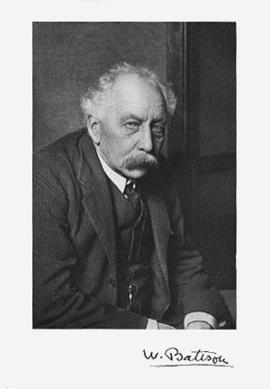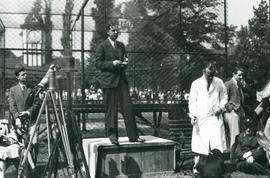Patrick Bateson was an English biologist with interests in ethology and phenotypic plasticity. He was Professor at the University of Cambridge and served as President of the Zoological Society of London from 2004 to 2014.
William Bateson was an English biologist who was the first person to use the term genetics to describe the study of heredity, and the chief populariser of the ideas of Gregor Mendel. He is the 'Father of Modern Genetics'
Sir Barry Albert Cross was a British biologist. He was a Fellow of Corpus Christ College, Cambridge. He was Secretary of the Zoological Society of London 1988-1992. He was knighted in 1989.
Ernst Haeckel was a German zoologist, naturalist, eugenicist, philosopher, physician, professor, marine biologist and artist. He discovered, described and named thousands of new species, mapped a genealogical tree relating all life forms and coined many terms in biology, including ecology, phylum, phylogeny and Protista. Haeckel promoted and popularised Charles Darwin's work in Germany and developed the influential but no longer widely held recapitulation theory claiming that an individual organism's biological development, or ontogeny, parallels and summarises its species' evolutionary development, or phylogeny.
The published artwork of Haeckel includes over 100 detailed, multi-colour illustrations of animals and sea creatures, collected in his Kunstformen der Natur ("Art Forms of Nature"), a book which would go on to influence the Art Nouveau artistic movement
Professor Edward Hindle was a British biologist and entomologist who was Regius Professor of Zoology at the University of Glasgow from 1935 to 1943. He specialised in the study of parasites. He was founder of the Zoological Society of Glasgow. In 1943 he was appointed the first Scientific Director of the Zoological Society of London
Huxley was an English evolutionary biologist, eugenicist and internationalist. He was a proponent of natural selection and a leading figure in mid-twentieth century modern synthesis. He was Secretary of the Zoological Society of London 1935-1942, the first Director of UNESCO, a founding member of the World Wildlife Fund, the President of the British Eugenics Society 1959-1962, and the first President of the British Humanist Association.
He was well known for his presentation of science in books and articles, and on radio and television. He directed an Oscar winning wildlife film. He was awarded UNESCO's Kalinga Prize for the popularisation of science in 1953, the Darwin Medal of the Royal Society in 1956, and the Darwin-Wallace Medal of the Linnaean Society on 1958. He was knighted in 1958. In 1959 he received a Special Award of the Lasker Foundation in the category Planned Parenthood - World Population.
In 1935 Huxley was appointed Secretary to the Zoological Society of London, and spent much of the next seven years running the society and its zoological gardens, London Zoo and Whipsnade Park, alongside his writing and research. Huxley introduced a range of ideas for making the Zoo child friendly. He fenced off the Fellow's Lawn to establish Pets Corner, appointed new assistant curators who he encouraged to talk to children, and he initiated the Zoo Magazine.
Biologist
Arthur Loveridge was a British biologist and herpetologist who wrote about animals in East Africa, particularly Tanzania, and New Guinea. He gave scientific names to several gecko species in the region. In 1924, he joined the Museum of Comparative Zoology in the grounds of Harvard University, where he was the curator of herpetology. He returned to East Africa on several field trips and wrote many scientific papers before retiring from Harvard in 1957. On retirement, they moved to Saint Helena in the South Atlantic, from where he continued his interest in natural history, publishing several articles on the island's wildlife in the St Helena Wirebird and St Helena News Review in the 1960s & 1970s. Several species and subspecies of reptiles are named in his honor, including Afroedura loveridgei, Anolis loveridgei, Atractus loveridgei, Elapsoidea loveridgei, Emoia loveridgei, Gongylophis colubrinus loveridgei, Melanoseps loveridgei, Philothamnus nitidus loveridgei, and Typhlops loveridgei.[1]
Three species of endemic St Helenian insect were named after him. the cranefly Dicranomyia loveridgeana, the blackfly Simulium loveridgei, and the subgenus Loveridgeana of the hoverfly genus Sphaerophoria, with Spherophora (Loveridgeana) beattiei known on the island as Loveridge's hoverfly. His insect collecting satchel is on display in the St Helena Museum in Jamestown
Biologist
George John Romanes was a Canadian-Scots evolutionary biologist and physiologist who laid the foundation of what he called comparative psychology, postulating a similarity of cognitive processes and mechanisms between humans and other animals. He is considered to invent the term neo-Darwinism, which in the late 19th century was considered as a theory of evolution that focuses on natural selection as the main evolutionary force

